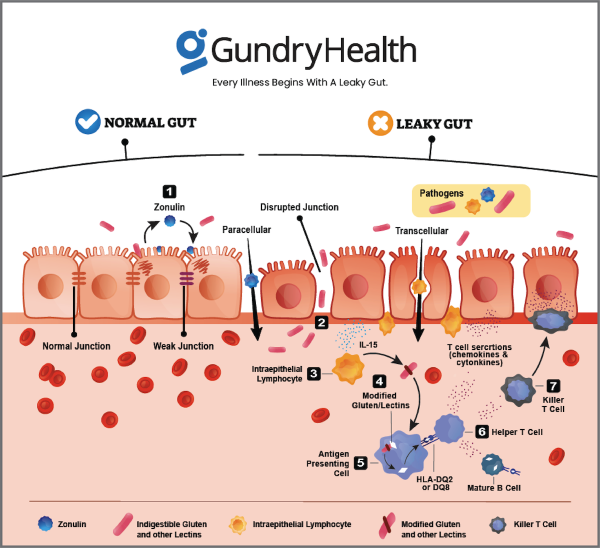A Cure for Crohn’s Disease? Dr. Steven Gundry Says It’s Possible – Look for These Signs of Crohn’s Disease
Discover what is Crohn’s disease, the signs and symptoms, and a “Crohn’s disease diet change” that could make a major difference.
What is Crohn’s disease?
Crohn’s disease is a type of inflammatory bowel disease (or IBD). IBD refers to a group of autoimmune disorders These disorders, like Crohn’s disease, cause long-term inflammation of your digestive tract.
Currently, researchers don’t know much about Crohn’s disease: what causes it, who is most likely to develop it, or how to treat it most effectively.
However, there are a few things we do know about Crohn’s disease, and this could be important for you or a loved one to know:
- You can get Crohn’s disease at any age. However, it is commonly diagnosed in people between the ages of 20 and 30.
- According to the Crohn’s & Colitis Foundation, between 1.5 and 28 percent of people with IBD have a first-degree relative who also has the disease.
- There doesn’t appear to be an ethnic component to who gets Crohn’s disease. However, the disease does appear to be more common in people of Caucasian descent.
What are the signs and symptoms of Crohn’s disease?
Symptoms of Crohn’s disease tend to begin gradually and get worse over time. Early symptoms of Crohn’s disease may include the following:
- Diarrhea
- Abdominal pain or abdominal cramping
- Loss of appetite or feelings of fullness
- Fever
- Sudden or abnormal weight loss
- Blood in stool
- Feeling like your bowels aren’t empty after a bowel movement
How is Crohn’s disease different from irritable bowel disease?
While Crohn’s disease is a type of irritable bowel disease, not all irritable bowel disease are Crohn’s. Another common IBD is ulcerative colitis.
So what makes Crohn’s disease different?
Crohn’s disease – unlike some other forms of IBD – can affect any part of the gastrointestinal tract, from the mouth to the anus. However, it most commonly affects the last part of the small intestine, called the ileum.
Crohn’s can also affect the entire thickness of the bowel wall. Oddly, though, inflammation of the intestine caused by Crohn’s disease can actually leave some areas of the intestine unaffected. In other words, there can be patches of diseased intestines alongside unaffected areas.
By contrast, ulcerative colitis – while similar to Crohn’s in many ways – only affects the colon. It also only affects the outermost layer of tissue lining the colon, called mucosa.
What are the different types of Crohn’s disease?
While there are several different types of Crohn’s disease (listed below), the most common form is called Ileocolitis. It affects the end of the small intestine, known as the terminal ileum, as well as the colon (or large intestine).
Other types of Crohn’s disease include:
- Ileitis – this type only affects the small intestine (or ileum), usually with swelling and inflammation.
- Gastroduodenal – affects the stomach and top of the small intestine (or duodenum) with inflammation and irritation.
- Jejunoileitis – causes patchy areas of inflammation to develop in the upper half of the small intestine.
What causes Crohn’s disease? Where does Crohn’s disease come from?
While the exact cause of most irritable bowel diseases is unknown, there’s now strong evidence that environmental factors play a big role.
According to former heart surgeon and New York Times best-selling author Dr. Steven Gundry, there’s one reason so many of his patients come to him with irritable bowel diseases like Crohn’s and UC.
And unsurprisingly, it starts in your gut.
You see, the immune cells along your gut lining play an important role in keeping your gut wall strong. They decide what can leave the GI tract and what must stay contained.
When everything is working well, nothing gets through this strong gut barrier except what’s supposed to. However, when this barrier gets worn down (more on that below) and develops more and more microscopic holes, it allows other compounds to “leak” through, causing your health to suffer.
This is the condition known as “leaky gut.”
Here’s another way to think about it…
Imagine your body is a fortress. You need a wall to protect yourself. That’s your gut wall. Immune cells are the soldiers there to protect your fortress. Their job is to detect friend from foe. And when they fight for you, they cause collateral damage. We call that collateral damage inflammation.
However, your protective walls aren’t sealed shut. All along the wall are tiny doors. And while these doors are closed most of the time, sometimes they need to open to allow food or friends to come in.
So imagine what would happen if those doors were always open. It would be much harder for your soldiers to defend the fortress (your body). Now, there is a molecule (called zonulin) inside your body that makes these “doors” in your gut wall open or close. And there are certain environmental triggers that make your cells produce zonulin.
One of these “triggers” is gluten. Humans, it turns out, were never meant to eat this food. And for most of human history, we didn’t. But once humans stopped living a hunter-gatherer lifestyle and started farming, gluten became a staple of our diets. Which might not have been a problem, except for one thing.
You see, gluten has certain protein “fragments” that humans can’t digest. Because of that, these “fragments” communicate with the soldiers on your gut wall and say, “Please, release zonulin and let us in.” Your immune system, though, thinks these proteins are invaders and starts fighting back. This causes inflammation.
How a leaky gut leads to Crohn’s disease
When the wrong molecules or even bacteria get across the border of your gut wall, your immune system kicks into high gear. Normally, this is really important since your immune system can call in “reinforcements” – inflammatory hormones called cytokines.
These cytokines can save your life from a bacterial infection and help you heal when you have an injury.
The problem starts when your immune system starts responding to every little thing. Think of it like an overactive security alarm system. You’re grateful when it alerts you to the presence of a thief, but you’re annoyed when it goes off every time a fly enters your home.
That’s exactly what happens when you have a leaky gut. Your immune system begins responding to everything that gets through your porous gut wall. This leads to chronic inflammation.
Now here’s what all this has to do with autoimmune diseases like Crohn’s disease. The zonulin gene sits on a certain chromosome linked to many autoimmune diseases, certain types of cancer, and diseases of the nervous system like multiple sclerosis.
So while genetics and your environment do play a role in whether you develop autoimmune diseases like Crohn’s, a leaky gut is the crucial third cause. This is why it’s so important to keep your gut wall strong. And unlike your genetics, and often unlike your environment, you can fix a leaky gut.
What happens when you DON’T deal with your irritable bowel disease symptoms
If you don’t address your symptoms of Crohn’s disease at the source – a leaky gut – it can lead to many long-term complications.
These include malnutrition and weight loss, intestinal rupture (which is as uncomfortable as it sounds), bowel obstruction, and colorectal cancer.
That’s why it’s absolutely critical to notice your symptoms of Crohn’s disease and speak with a doctor or specialist about what you can do to address the problem.
How to treat Crohn’s disease (and Dr. Gundry’s “Crohn’s disease diet plan”)
If you do suspect you may have Crohn’s disease, or if you’re already suffering from Crohn’s disease symptoms, there are some steps you can take right at home.
Dr. Gundry always begins with blood work. He looks for specific markers of autoimmune disease (for example, irritable bowel disease) and other key indicators of a bigger problem (like markers for gluten sensitivity).
Next, Dr. Gundry has his Crohn’s disease patients begin his specific dietary program. While this includes cutting gluten from the diet, it also includes cutting other inflammatory foods like sugar and lectins. However, this is not an elimination diet, nor is it about depriving yourself or feeling hungry.
Crohn’s Disease Success Stories
Patients who start this program are often amazed by the result. Like 20 year-old Jill W., one of Dr. Gundry’s former patients:
“After two weeks [on Dr. Gundry’s dietary program], I had the first normal bowel movement of my life, and they have been normal ever since.”
Get your own personalized irritable bowel disease care and recommendations from Dr Gundry-approved care coordinators
If you’re looking for more guidance than these simple recommendations for Crohn’s disease, Dr. Gundry’s unique health program is now available to you (without needing an appointment at one of Dr. Gundry’s two, waitlist-only West Coast clinics).
Thanks to the pioneering work of Dr. Gundry and his team at Gundry Health, care coordinators trained in Dr. Gundry’s unique holistic methods are now available to help you craft your own personalized Crohn’s disease program.







